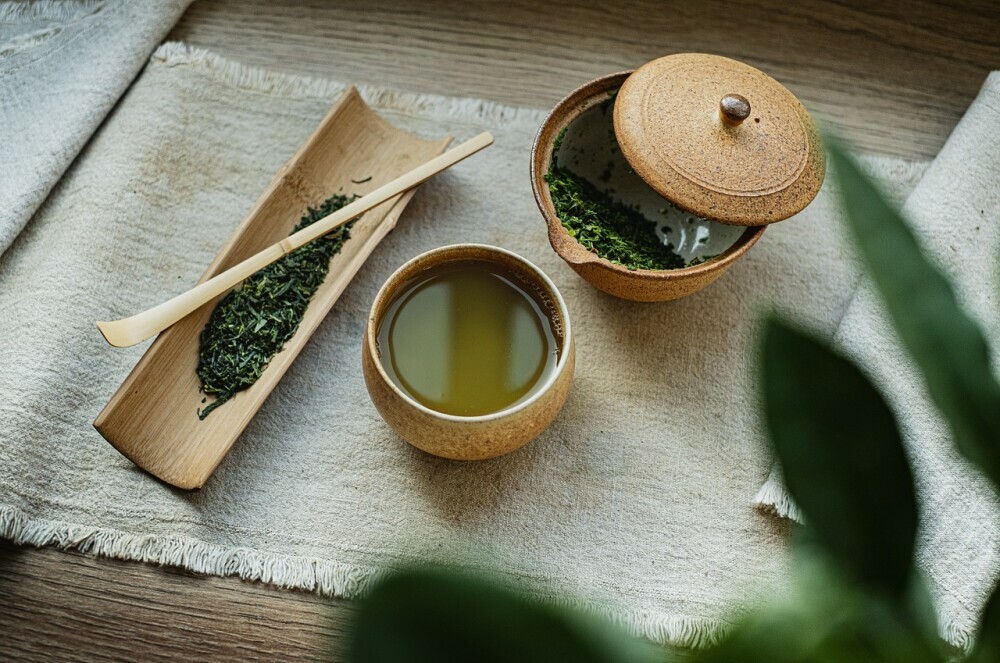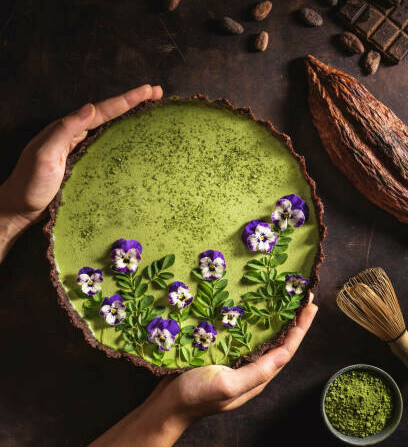Introduction: Unraveling the Mystique of Decaf Green Tea
Let’s find out today: ” Is Decaf Green Tea As Good For You As Regular Green Tea ?”. Green tea is highly regarded in the beverage industry due to its delicate flavor and numerous health advantages. However, what would occur if we eliminated caffeine? Explore the world of decaf green tea, a beverage that offers the best qualities of green tea without the caffeine.
Overview of Green Tea and Its Health Prominence
Because of its abundant antioxidant content, green tea, a staple in Asian cultures, has become increasingly popular worldwide. Packed with powerful antioxidants, flavonoids, and catechins are examples of polyphenols. By lowering the production of free radicals in the body, these compounds can shield molecules and cells from harm. Regular use of green tea has been associated with a decreased risk of weight loss, multiple cancers, and heart disease.
Rising Popularity of Decaffeinated Versions
The demand for decaffeinated versions of popular beverages has increased as people become more aware of the possible adverse effects of consuming excessive amounts of caffeine. Green tea in decaf is no different. It is the ideal option for people sensitive to caffeine or who would instead limit their intake because it has the same reviving flavor and health advantages as regular green tea without the added caffeine.
Aim of the Article: Comparing Decaf and Regular Green Tea
Although there are many similarities between regular and decaf green tea, they are different. The number of healthy compounds in tea may slightly decrease during decaffeination. Decaf green tea is still a strong contender in health beverages because it maintains many of these beneficial ingredients.
You choose wisely for your health, whether you use regular or decaf green tea. So go ahead and taste the flavor of wellness while steeping a cup.
Unveiling the Health Benefits: Decaf vs. Regular Green Tea

Green tea is a well-known health beverage available in two forms: regular and decaffeinated. But in terms of health benefits, does the decaf version compare favorably to its caffeinated counterpart? Let us explore and discover.
Does Decaf Green Tea Have The Same Health Benefits?
For those who prefer the health benefits of green tea without the caffeine, decaf green tea is a popular option. Does it have the same health advantages as ordinary green tea? In short, the answer is yes, but only partially.
Antioxidant Content in Decaf vs. Regular
Regular and decaf green tea contains polyphenols and antioxidants that help the body fend off dangerous free radicals. Nevertheless, the antioxidant content may be decreased during the decaffeination process. Decaf green tea, nonetheless, has a strong antioxidant content despite this.
Impact on Heart Health, Memory, and Stress Relief
A lower risk of heart disease has been linked to the antioxidant content of both regular and decaf green tea. It is also linked to enhanced cognitive and memory performance. Regarding reducing stress, decaf green tea still has Theanine, an amino acid with calming properties, even though it lacks the calming effect of caffeine.
Despite minor variances, regular and decaf green tea have significant health advantages. Hence, you can enjoy a cup of green tea knowing that you are doing something good for your health, regardless of whether you love caffeine or would rather avoid it altogether.
Rejuvenating Spring: The Prime Season for Green Tea Enthusiasts

Green tea lovers are in their prime season as the world awakens to the vivid colors of spring and the chill of winter fades. Green tea is the ideal beverage for the season because it has rejuvenating properties that mirror the promise of renewal that spring brings.
Why Spring Is the Greatest Season for Fans of Green Tea
When spring arrives, nature rejuvenates itself, and there is no better way to celebrate than with a cup of green tea. Green tea’s bright, fresh flavors complement the budding flowers and balmy weather. In addition, spring is when green tea leaves are harvested, so you can be sure to get the freshest and most flavorful brew.
Green Tea’s Healing Potential for Springtime Illnesses
Even though spring is lovely, it can also bring seasonal illnesses like allergies. Green tea saves the day in this situation. Rich in anti-inflammatory and antioxidant qualities, green tea is a natural cure for springtime ailments and can help reduce allergy symptoms.
Different Types of Green Tea: Ideal for Indulging in the Spring
There are a few types of green tea that are especially pleasant in the spring. Sencha, with its subtle sweetness, reflects the soft warmth of spring. Matcha, with its vivid green hue, is evocative of the verdant surroundings. Then there’s Jasmine green tea, with floral undertones reminiscent of springtime blossoms.
Green tea and spring go hand in hand. So, as the world around you blossoms, take a moment to sip a cup of green tea and greet the invigorating force of spring.
Nature’s Own Remedy: Green Tea’s Role in Seasonal Wellness

Green tea, a gift of nature, is essential to seasonal well-being. It is a natural remedy for many seasonal illnesses because of its high antioxidant content and numerous health benefits.
Sip on a Cup of Tea to Soothe Seasonal Colds
Many of us struggle with the dreaded seasonal sniffles as the seasons change. Sore throats and runny noses can be soothed with a warm cup of green tea. Warm tea with steam helps open up nasal passages, and green tea’s antioxidants strengthen your immune system and expedite healing.
Robust Bones Using Green Tea: What the Studies Say
Recent research has highlighted another possible advantage of green tea: bone health. Green tea’s polyphenols may help increase bone density and lower the risk of fractures, so drinking green tea could be a step toward stronger bones.
Tea For Slumber: Picking the Right Blend for Better Rest
Overall health depends on getting enough sleep, and green tea may help. Although green tea contains caffeine, it also contains Theanine, an amino acid that has been shown to help with sleep. Choosing a decaffeinated green tea blend prior to going to bed can promote relaxation and a restful night’s sleep.
Green tea is more than just a cool drink. This adaptable health beverage can support you as you deal with the various seasons and the accompanying illnesses. Now pour yourself a cup, relax, and let nature’s best remedy do its magic.
Counteracting Sluggishness: Energize Your Workday with Decaf Green Tea

It is easy to feel lethargic during the rush of the workday. But what if there was a way to get your day going without the caffeine jitters? The beverage in question is decaf green tea, which claims to stimulate your senses and maintain your focus without giving you a caffeine crash.
Say Goodbye to After-Meal Dizziness: Office Green Tea Tips
We have all experienced the after-meal slump that makes us want to curl up under our desks and take a nap. However, you can wave goodbye to after-meal dizziness with a cup of decaf green tea. Green tea’s antioxidants assist in controlling blood sugar levels, which helps to avoid the post-meal energy slump that frequently occurs. The next time you are experiencing a post-lunch slump, try drinking decaf green tea.
Decaffeinated Green Tea: A Productivity-Boosting Beverage?
Is decaf green tea the key to increased productivity? According to some research, green tea’s polyphenols may improve brain activity, increasing concentration and focus. You will not have to worry about the mid-afternoon crash either, because there will not be any caffeine. Therefore, a cup of decaf green tea might be the solution if you want to increase your productivity.
No More Sacrifices: How to Enjoy Green Tea Without the Caffeine
Decaf green tea is the ideal option for people who enjoy green tea’s flavor and health advantages but are sensitive to caffeine. You can still enjoy green tea’s cooling flavor and health advantages without the caffeine. Decaffeinated green tea allows you to have it all without making any compromises.
Lightening the Winter Blues: The Soothing Effect of Green Tea on Sore Throats

Winter is a season of crisp winds, cozy evenings, and the dreaded cold and flu season. Green tea comes into its own in the wintertime, providing warmth and relief while acting as a calming salve for sore throats.
Better Soothe for Sore Throats: Green Tea, a Great Winter Drink
Soothe a sore throat with a hot cup of green tea. The tea’s antioxidant qualities strengthen your immune system and hasten your recovery, while its warmth eases sore throats. Green tea also helps you stay hydrated, which is essential when feeling under the weather. It makes sense why green tea has become so popular as a wintertime libation.
Is Green Tea Really Effective for Winter Illnesses?
Green tea’s ability to treat winter illnesses is more than an urban legend. According to studies, green tea’s antioxidants can help fight off viruses, which makes it a valuable treatment for the flu and the common cold. Green tea also has anti-inflammatory qualities that help lessen inflammation and ease sore throats.
Green tea is not just a tasty beverage. This all-natural remedy is a beautiful addition to your winter wellness routine because it has health benefits. Thus, the next time you feel under the weather, make some green tea and let its therapeutic qualities do their thing.
Green Tea Without the Buzz: The World of Decaffeination Methods
Green tea is particularly valued within the tea realm. What if, however, you could get all the health advantages of green tea without the caffeine? Introducing the world of decaffeinated green tea, a drink that has all the benefits of green tea without the afterglow.
How is Green Tea Decaffeinated? An Overview of the Patented Water Process
Green tea decaffeination is a delicate process. The Patented Water Process is one of the most widely used techniques. Soaking the tea leaves in water eliminates the caffeine from the leaves without affecting the healthy ingredients. After that, a carbon filter is used to extract the caffeine from the water, and the water is added back to the tea leaves to absorb the healthy ingredients once more.
Retaining Benefits: The Impact of Decaffeination on Health Properties
One may wonder if the decaffeination process impacts green tea’s health advantages. While decaffeination may cause a slight reduction in some beneficial compounds, most are retained. This indicates that decaffeinated green tea is still very beneficial to health, providing a wealth of antioxidants and other health-promoting ingredients.
Not a Drop of Tea or Coffee? The Residual Benefits After Decaffeination
Green tea retains most of its health benefits even after it has been decaffeinated. Its antioxidants, which can help shield the body from harm caused by free radicals, are still abundant. It also retains its calming qualities, which makes it an excellent beverage option for people who want to cut back on caffeine without losing the health benefits of green tea.
Green tea’s health advantages can be enjoyed without the caffeine of decaf green tea. Therefore, it is an excellent option if you are sensitive to caffeine or want to reduce your intake.
The Pros and Cons of Decaf Green Tea

Many people prefer to drink decaf green tea, which has all the health advantages of green tea but none of the caffeine. However, like any food or beverage, decaf green tea has advantages and disadvantages. Let us explore the world of decaf green tea and consider its advantages and disadvantages.
Decaf Green Tea: Weigh the Benefits and Drawbacks
The most evident advantage of decaf green tea is its lack of caffeine. This makes it a fantastic option for people who are sensitive to caffeine or want to cut back on their intake. Additionally, it still has most of the health advantages of regular green tea, such as its antioxidant content.
Nevertheless, the decaffeination procedure may decrease the number of health-promoting ingredients in the tea slightly. Additionally, some people notice a subtle taste difference between regular and decaf green tea.
How Does Decaf Stack Up Against Regular Green Tea in Terms of Healthiness?
Decaf green tea is just as beneficial to health as regular green tea. Even though decaffeination might have reduced some of the health-promoting compounds, decaf green tea still has a substantial amount of antioxidants and other beneficial ingredients.
But if you drink green tea for its caffeine-related advantages, like better alertness or metabolism, regular green tea may be more advantageous.
Exploring the Less-Talked-About Side Effects of Decaffeinated Green Tea
Although decaf green tea is generally safe to consume, excessive consumption can have negative effects. Despite the absence of caffeine, these can include iron deficiency, stomach issues, and even difficulty sleeping. Decaffeinated green tea should always be consumed in moderation, and you should pay attention to your body’s signals.
Decaf green tea is, all things considered, a fantastic beverage option with lots of health advantages. As with anything else, it is important to use it sparingly and be mindful of any possible negative consequences.
Culinary Creativity: Incorporating Decaf Green Tea in Your Kitchen

With its subtle flavor and numerous health advantages, decaf green tea is meant for more than just drinking. It can also be a special ingredient in your cooking, bringing creativity to your recipes.
Infusing Meals with a Touch of Tea: Recipe Ideas
Numerous recipes call for decaf green tea. Soups, salads, and even desserts can benefit from its subdued flavor. For example, you could incorporate it into a creamy custard for a novel dessert or use it as a relaxed and crisp noodle salad foundation. The best part is that you can incorporate green tea’s health benefits into your meals, so the options are virtually limitless.
Crafting the Perfect Cup: Best Brewing Practices for Decaf Green Tea
Making decaf green tea is a specialty in and of itself. Using cold, fresh water is the first step towards creating the ideal tea. Allow it to settle for a minute or two after it boils. After covering the tea leaves with hot water, steep for approximately three minutes. Beware that over-steeping can result in a bitter tea flavor, so be mindful of the time.
Storage and Preservation: Keeping Your Tea Fresh and Flavorful
Proper storage is the secret to keeping your decaf green tea’s flavor and freshness intact. Keep it somewhere cold and dark, away from strong smells. To prevent the tea leaves from deteriorating and losing flavor, store them in an airtight container that is sealed against light, moisture, and air.
Decaf green tea is a multipurpose component that has many health advantages and can bring some creativity to your kitchen. Decaf green tea is, therefore, definitely something to experiment with, whether you plan to drink it straight from a cup or add it to your food.
I would love to receive your comments down below, in case you have any.

